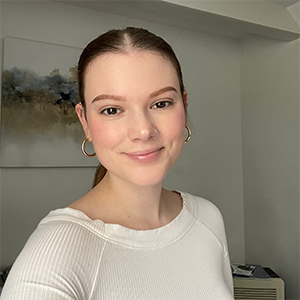- Home
- Student Life
- Griffin Success Stories
- Emilyrose Rarrick
Emilyrose Rarrick
Social Work 2025

Current Position: Case Manager, Peace Valley Recovery, and Master of Social Work student
Job Title Updated: Summer 2025
Story Posted: Spring 2025
Emilyrose Rarrick transferred to GMercyU from Montgomery County Community College (MCCC) in fall 2023 after connecting with Dr. Janice Nuss through Phi Theta Kappa Honor Society. The connection with Dr. Nuss made Emilyrose feel welcomed into the GMercyU community even before committing.
As a commuter, Emilyrose needed a flexible program to accommodate her schedule. Even while working two jobs and balancing a full course load, Emilyrose found success within the Social Work program. Alongside its flexibility, GMercyU’s Social Work program allowed Emilyrose to stay on track for graduation while preparing her to complete her master’s degree in one additional year.
I always say, 'Gwynedd will never let you fail.' The level of support here is unreal. The professors genuinely want you to succeed, and the small class sizes mean you’re not just a name on a roster. You’re a person with goals, struggles, and a story that matters. But what really sold me? The way the Mercy values are woven into everything we do. It’s one thing to talk about social justice; it’s another to actively live it out. I am proud to be a Mercy student.
Volunteer Work
Outside of her busy schedule as a student, Emilyrose is part of the Montgomery Counter chapter of Bikers Against Child Abuse (B.A.C.A.), a nonprofit organization dedicated to creating a safer world for children who have experienced abuse. The organization’s goal is to empower impacted children by providing support to reclaim their sense of security, strength and resilience.
“B.A.C.A. operates with a powerful yet simple mission: No child should ever feel alone or afraid. Our members act as a visible force of protection, standing beside children as they navigate the emotional, psychological, and legal challenges that follow abuse,” Emilyrose said.
The organization collaborates with local agencies like the Montgomery County Office of Children and Youth and the District Attorney’s office to identify children and families needing support.
Why Social Work
Emilyrose’s academic journey didn’t follow a traditional path. After initially enrolling in college in 2017, Emilyrose made the difficult – but necessary decision – to leave in 2019 to seek recovery.
Today, Emilyrose is five years sober and credits that decision with getting her to where she is today. It’s also what led her to major in Social Work.
Why social work? Because I lived it. Social work is not just a career path for me, it is a calling. My own experiences have strengthened my ability to connect with clients, deepened my empathy, and solidified my commitment to addressing the systemic barriers that contribute to addiction and mental health challenges.
Emilyrose has loved her time in the Social Work program. One of the most impactful classes she’s taken is Research Methods with Dr. John Gunn because it gave her the opportunity to conduct research on the intersection stigma, shame, and recovery outcomes for individuals with substance use disorders within rural Appalachia.
Her research found that addiction-related stigma serves as both a social and structural barrier to treatment, negatively affecting underserved communities.
“Now, my mission is bigger than just my own recovery. I want to tackle the systemic factors that keep people trapped in cycles of addiction. When we address these barriers head-on, we do not just help individuals. We change entire communities!,” Emilyrose said. “Dr. Gunn encouraged me to pursue a topic that deeply mattered to me, reinforcing my passion for developing stigma-informed treatment solutions.”
Internship Experience
During her senior year, Emilyrose completed an internship at Peace Valley Recovery Center where she worked directly with clients in the Partial Hospitalization Program. She assisted her clients in navigating recovery from substance use disorder by leading group therapy sessions, providing individual support, and applying evidence-based modalities to help her clients build a solid foundation for lasting change.
“This experience has been invaluable in bridging the gap between theory and practice,” Emilyrose said.
Post-Graduation Plans
Although she is still exploring different paths to take after graduation, Emilyrose plans to continue strengthening her clinical skills in the field of addiction treatment, but can potentially see herself branching into policy and advocacy work.
“I know that I want to contribute to systemic change. Maybe I will dive deeper into law and policy. Maybe I will carve out a space in academic. Maybe I will find a way to do both. Whatever comes next, GMercyU has given the foundation to make it happen, and I cannot wait to see where it takes me,” Emilyrose said.